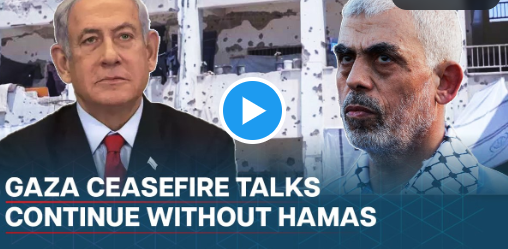If you take a step back from the current Middle East conflict, you may come to the conclusion that war will not stop until President Trump is back in office. The Dmeocrats are the party of war and conflict, and every move they make in the U.S. is designed to arm Iran and Hamas, while supplying Israel with what is needed to fight them. In other words, under Democrat leadership, the United States is the Joker on the international stage. With the American public paying for it all with money they do not have.
The United States, Qatar, and Egypt have issued a joint statement announcing a “bridging proposal” aimed at swiftly ending the conflict in Gaza and securing the release of Israeli captives. On Friday, the three nations emphasized that ceasefire negotiations in Doha have been “serious and constructive.” These talks began on Thursday, amid rising fears of a broader regional conflict following the assassination of a top Hezbollah commander in Beirut and the killing of Hamas’s political leader Ismail Haniyeh in Tehran.
#FPVideo: A new round of Gaza ceasefire talks that began on Thursday in Doha, the capital of Qatar, involving Qatar, Egypt, the United States, and Israel will continue on Friday. pic.twitter.com/cTFkrRrgdJ
— Firstpost (@firstpost) August 16, 2024
The joint statement reiterated the mediators’ firm stance against any delays in implementing a ceasefire agreement and releasing captives. “The path is now set for that outcome, saving lives, bringing relief to the people of Gaza, and de-escalating regional tensions,” the statement read. Although specific details of the proposal were not disclosed, it builds on a plan introduced by U.S. President Joe Biden in May.
The proposed plan, supported by the U.S., outlines a phased approach to ending the war. The first phase involves a six-week pause in hostilities, during which some Israeli captives held in Gaza and Palestinian prisoners in Israeli jails would be released. The second phase would see a permanent end to the fighting and the release of all remaining captives. The final phase includes the reconstruction of the Gaza Strip, which has been severely damaged by the ongoing conflict.
The mediators noted that working teams will continue to refine the technical details in the coming days, including the specifics of implementing the agreements, extensive humanitarian provisions, and issues related to hostages and detainees.
On Friday, President Biden expressed cautious optimism about the possibility of reaching a deal, stating, “We may have something, but we’re not there yet – much, much closer than it was three days ago.” The White House later confirmed that Biden had separate phone conversations with Qatari Emir Sheikh Tamim bin Hamad Al Thani and Egyptian President Abdel Fattah el-Sisi to discuss the “significant progress” in the ceasefire talks.
#TheWestAsiaPost | Mediators hold new Gaza ceasefire talks
Qatar hosts delegation from US, Israel and Egypt @esha_hanspal tells you more #IsraelHamasWar #GazaWar pic.twitter.com/z9wOoCX7qB
— WION (@WIONews) August 16, 2024
Additionally, U.S. Secretary of State Antony Blinken is scheduled to travel to Israel on Saturday to continue diplomatic efforts to finalize the agreement. The State Department emphasized the importance of all parties in the region avoiding any actions that could undermine the negotiations.
Hamas, however, has made it clear that it would only agree to a deal that includes a permanent ceasefire, a complete withdrawal of Israeli forces from Gaza, and a “serious” prisoner exchange. Husam Badran, a member of the Hamas political bureau, reiterated this position on Friday, criticizing Israeli Prime Minister Benjamin Netanyahu for allegedly obstructing the talks. Badran also expressed skepticism about U.S. involvement, accusing the U.S. of enabling Israel’s actions in Gaza rather than acting as a neutral mediator.
On the Israeli side, opinions are divided. While some officials support the proposed ceasefire, Netanyahu has repeatedly stated that the war will continue until Israel achieves “total victory.” Reports indicate that Netanyahu is facing pressure from his security chiefs to accept the deal and avoid making new demands that could derail the talks. However, Netanyahu’s office suggested that it is Hamas, not Israel, that is hindering the negotiations, expressing appreciation for the efforts of the U.S. and other mediators.
Joint Statement from the United States, Egypt, and Qatar#MOFAQatar pic.twitter.com/A7myXPKsh3
— Ministry of Foreign Affairs – Qatar (@MofaQatar_EN) August 16, 2024
White House spokesperson John Kirby described the talks in Doha as having a “promising” start and stressed the importance of overcoming the remaining obstacles to conclude the process. The Qatari Ministry of Foreign Affairs also expressed its determination to continue efforts to achieve a ceasefire in Gaza. Despite these developments, implementation mechanisms are still pending, meaning that the final agreement has yet to be secured.
Major Points:
- The United States, Qatar, and Egypt proposed a “bridging proposal” to quickly end the Gaza conflict and secure the release of Israeli captives, with ceasefire talks in Doha described as “serious and constructive.”
- The U.S.-backed plan involves a phased approach, starting with a six-week pause in fighting, followed by a permanent ceasefire and the release of all captives, culminating in the reconstruction of Gaza.
- President Biden expressed cautious optimism about reaching a deal, with continued diplomatic efforts, including a planned visit by Secretary of State Antony Blinken to Israel.
- Hamas has stated it will only agree to a deal that includes a permanent ceasefire, Israeli withdrawal from Gaza, and a significant prisoner exchange, criticizing U.S. involvement as biased.
- Israel remains divided on the ceasefire, with Prime Minister Netanyahu insisting on continuing the war until “total victory,” despite pressure from his security chiefs to accept the proposed deal.
TL Holcomb – Reprinted with permission of Whatfinger News



